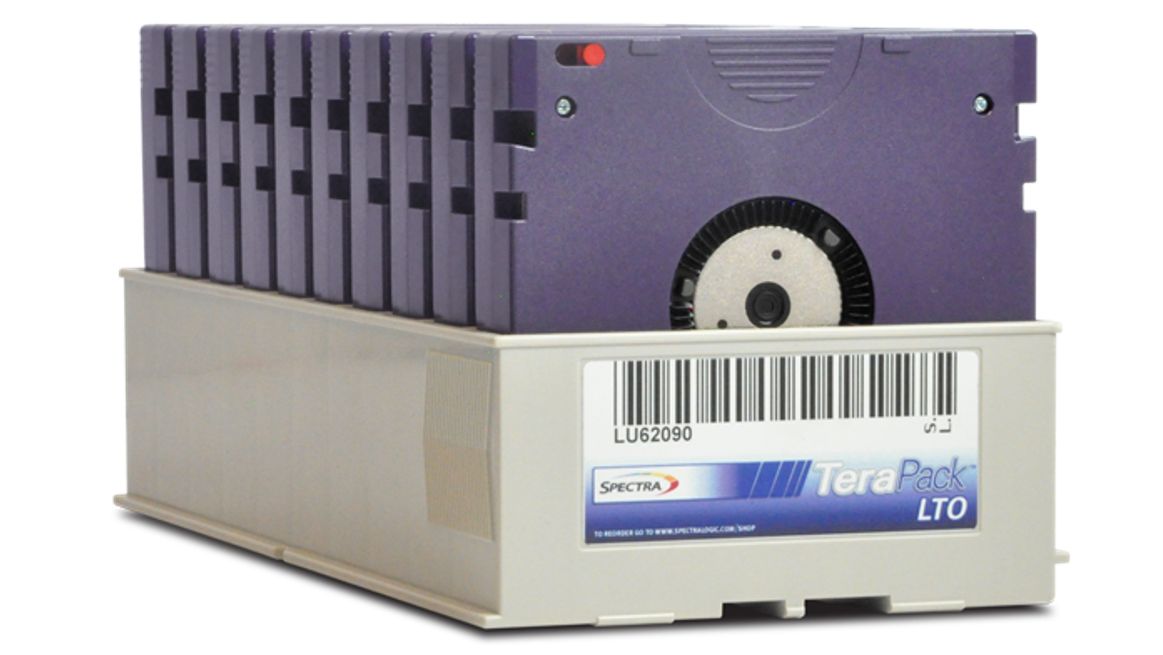18TB LTO tapes set for showdown with 18TB hard drives
Ribbon-based LTO tape will show no sign of slowdown amidst looming showdown with hard disks

Sign up for breaking news, reviews, opinion, top tech deals, and more.
You are now subscribed
Your newsletter sign-up was successful
Editors note: A spokesperson for LTO replied to TechRadar Pro explaining why they chose to launch an updated version of LTO-9 with a smaller capacity. The verbatim text is below.
"In order not to delay availability of the latest generation, the LTO Program elected to balance the cost and benefit of technology within the specification by offering an 18TB tape cartridge – a 50% increase in capacity from the previous generation – to address the current market need for storage space. Doubling capacity approximately every two years is still technically feasible for LTO tape technology and the LTO Program anticipates being able to return to that pattern in future generations."
After several months of suspense, updated details of the LTO Ultrium format generation 9 have been published with one big surprise.
The native/compressed capacity of cartridges has dropped to 18TB/45TB; the initial roadmap - which is still available on LTO’s website and was published in 2018 - pegged these numbers 24TB/60TB.
LTO-8 was unveiled in December 2017 while LTO-10 was expected to have a native capacity of 48TB native and 112.5TB compressed, doubling roughly in capacity to reach 192TB/480TB for LTO-12 with the standard 2.5:1 compression.
- Also check out the best cloud storage
- These are the best cloud storage for photos around
- We've also highlighted the best cloud backup providers
A 50% increase in capacity is only the second time in nine generations that LTO has not stuck to its “doubling capacity” formula. No details has been provided with regards to the compressed/uncompressed speed for that tape format. We have contacted the LTO Program to find out why that was the case and whether the capacities of future LTO generations will remain the same.
Hard drive competitor
Because of its intrinsic physical properties, tape remains the only real alternative to hard disk drives. An 18TB LTO-9 tape has an areal density of only 12Gb/in^2 compared to 1.02Tb/in^2 (in the case of the Seagate Exos 18 for example) which, in theory means that tape has a lot of room to grow.
Sign up to the TechRadar Pro newsletter to get all the top news, opinion, features and guidance your business needs to succeed!
“Tape is one of the most reliable and cost-effective storage solutions to retain data while keeping it safe from ransomware and other cyberattacks." said Chris Powers, Vice President of Collaborative Platforms Development and Big Data, at Hewlett Packard Enterprise.
Support for LTFS (Linear Tape File System), WORM (Write Once, Read Many) and hardware-based encryption means that the format is in for the long run as the need to archive even more data grows almost exponentially every year.
- These are the best external hard drives you can buy

Désiré has been musing and writing about technology during a career spanning four decades. He dabbled in website builders and web hosting when DHTML and frames were in vogue and started narrating about the impact of technology on society just before the start of the Y2K hysteria at the turn of the last millennium.